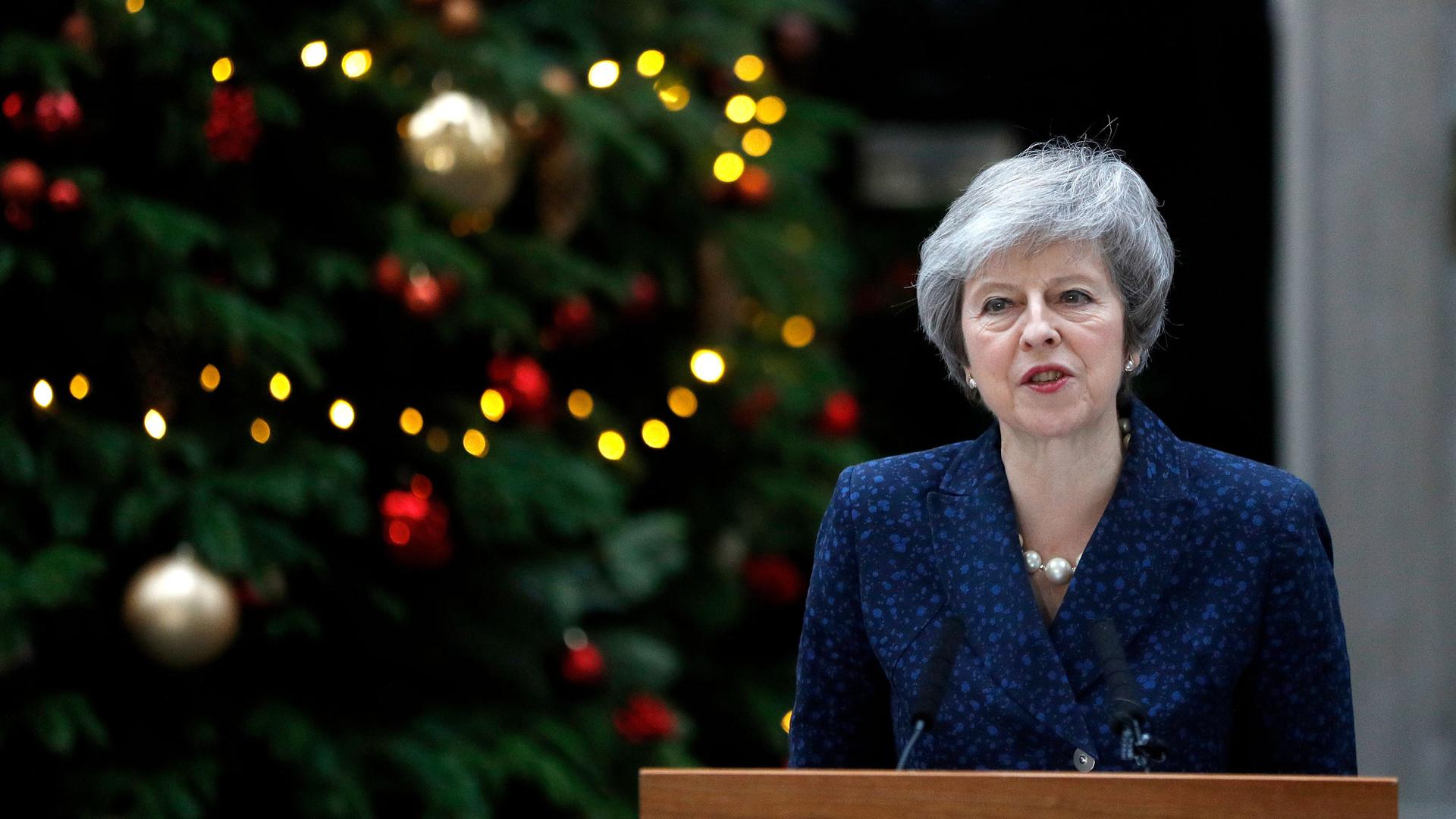British Prime Minister Theresa May fights leadership revolt, warns Brexit in peril
Britain’s Prime Minister Theresa May addresses the media outside 10 Downing Street in London, Dec. 12, 2018.
Less than four months until the United Kingdom is due to leave on March 29, Prime Minister Theresa May is now fighting for her job after Conservative lawmakers plan a vote of confidence on her leadership on Wednesday.
Britain’s exit from European Union has been plunged into chaos with options ranging from a potentially disorderly no-deal departure to another referendum that could reverse it.
Speaking outside her Downing Street residence hours before the vote of confidence on her leadership, May said she would battle for her premiership with everything she had.
In a stark warning to Brexit-supporting opponents who instigated the challenge, May said if they toppled her then the EU exit would be delayed and perhaps even stopped.
A new leader would not have time to renegotiate a deal with the EU and secure parliamentary approval by the end of March, meaning the Article 50 withdrawal notice would have to be extended or rescinded, she said.
“A change of leadership in the Conservative Party now would put our country’s future at risk and create uncertainty when we can least afford it,” she said. “Weeks spent tearing ourselves apart will only create more division just as we should be standing together to serve our country.”
A secret ballot will be held between 1 p.m. and 3 p.m. ET on Wednesday in a room at the House of Commons, and an announcement made at 4 p.m. Before the vote, May will speak to lawmakers at a closed meeting.
According to the rules, May could be toppled if a simple majority of Conservative lawmakers vote against her, though a significant rebellion could also undermine her position. At least 120 Conservative lawmakers had expressed public support for her.
Brexit is Britain’s most significant political and economic decision since World War II though pro-Europeans fear it will weaken the West as it grapples with the presidency of Donald Trump and growing assertiveness from Russia and China.
The outcome will shape Britain’s $2.8 trillion economy, have far reaching consequences for the unity of the United Kingdom, and determine whether London can keep its place as one of the top two global financial centers.
The British pound, which has lost 25 cents against the US dollar since the 2016 referendum, fell on the confidence vote but then rose to 1.2533 on news that Brexit might have to be delayed.
‘She must go’
May, a 62-year-old vicar’s daughter who voted to remain in the EU, won the top job in the turmoil that followed the 2016 EU referendum but promised to implement Brexit, while keeping close ties to the bloc, as a way to heal a divided nation.
Widely praised for a punishing work ethic and a dutiful approach to solving the Brexit divide, May’s premiership has been characterized by obduracy in the face of frequent crises.
Ever since formally triggering Brexit in March 2017, May has tried to find a way to keep Britain closely aligned with the EU after its exit — the essence of the divorce deal struck with Brussels last month.
But on Monday she abruptly pulled a parliamentary vote on her deal in the face of ridicule from lawmakers and a probable rout. She then rushed to Europe to seek assurances from EU leaders about the deal.
The EU has insisted it will not renegotiate but some of the bloc’s leaders have suggested Britain could still change its mind on leaving.
Brexit-supporting lawmakers in her party have accused May of betraying the people’s vote in negotiations while opponents say she struck a deal that is the worst of all worlds — out of the EU but with no say over many rules it has to abide by.
“Theresa May’s plan would bring down the government if carried forward,” lawmakers Jacob Rees-Mogg and Steve Baker said in a statement.
“But our Party will rightly not tolerate it. Conservatives must now answer whether they wish to draw ever closer to an election under Mrs. May’s leadership. In the national interest, she must go.”
Schism in the UK
A schism over Europe in the Conservative Party over Britain’s relationship with the EU contributed to the fall of all three previous Conservative premiers — David Cameron, John Major and Margaret Thatcher.
Cameron bet all on a referendum he lost in 2016.
Now, May — whose personal standing was already weakened by a snap election last year which cost her a parliamentary majority — also sees her own fate at risk over Europe.
Senior ministers including Chancellor of the Exchequer Philip Hammond, Foreign Secretary Jeremy Hunt, Environment Secretary Michael Gove and Home Secretary Sajid Javid expressed support for her. They warned that changing leader at such an important moment in British history was folly.
But as investors and company bosses tried to gauge the ultimate outcome of the political crisis, some were betting that Brexit would be thwarted.
The EU’s top court ruled on Monday that Britain could cancel its Article 50 notice to leave without permission from other members and without losing special privileges.
Both May’s ruling Conservatives and the main opposition Labor Party are publicly committed to carrying out Brexit.
A no-deal Brexit, though, is seen as so disruptive to trade and the economy that parliament would be under pressure to block it.
“I am backing the prime minister 100 percent,” said Gove, the most senior Brexiteer in May’s government. “She is battling hard for our country and no one is better placed to ensure we deliver on the British people’s decision to leave the EU.”
By Kylie MacLellan and Guy Faulconbridge/Reuters
Additional reporting by Kate Holton, Andy Bruce, Michael Holden, Paul Sandle and William James; Writing by Guy Faulconbridge; Editing by Andrew Cawthorne.
